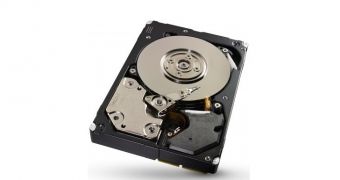You may remember that, back in July, word came out about a new hard disk drive unit from Seagate, one that promised to provide customers with a total capacity of 8 TB all on its lonesome. Well, that drive has just been formally launched.
Indeed, the company has released the new storage device, scoring quite a few brownie points for reaching this capacity before everyone else.
Although, admittedly, when you only have two other rivals to contend with, competition isn't quite as heated and chaotic as it could be.
And with Western Digital having unveiled 6 TB drives not too many weeks ago, Seagate chose a pretty opportune moment to release its latest achievement.
Just don't expect to instantly find it anywhere for sale. Indeed, you might not find it up for retail order at all, because it's not exactly intended for the common man.
And we're not just talking about the overkill capacity level, or the high price, which, unfortunately, has not been disclosed yet.
We're saying you're unlikely to find the thing up for sale because Seagate made it for enterprise customers. You know, companies that want to build a good mainframe, or upgrade their existing one.
Also, the HDDs will do very well in cloud servers and data centers. Even if the systems use SSDs for most incoming and outgoing communications, the bulk of the data, like backups and such, will quite neatly settle on the platters of 8 TB HDDs.
This is probably why Seagate didn't even bother specifying the price of the thing in its latest press release: it's not set. It will depend on the size of the order, the history between Seagate and the company placing the order, the negotiation skills of the one making the order, etc.
As far as we can see, the 8 TB HDD has the same number of platters as 6 TB drives (5 platters). It's just that the data density is a lot higher than before.
Multi-drive RV tolerance for consistent enterprise-class performance in high density environments is supported as well (otherwise multiple HDDs connected to the mainboard might not play well together).
In addition to a large capacity per system, the new Seagate 8 TB HDD allows for a lot of power savings, since each HDD powers more memory for the same power as a 2TB or 4 TB drive, more or less.

 14 DAY TRIAL //
14 DAY TRIAL //